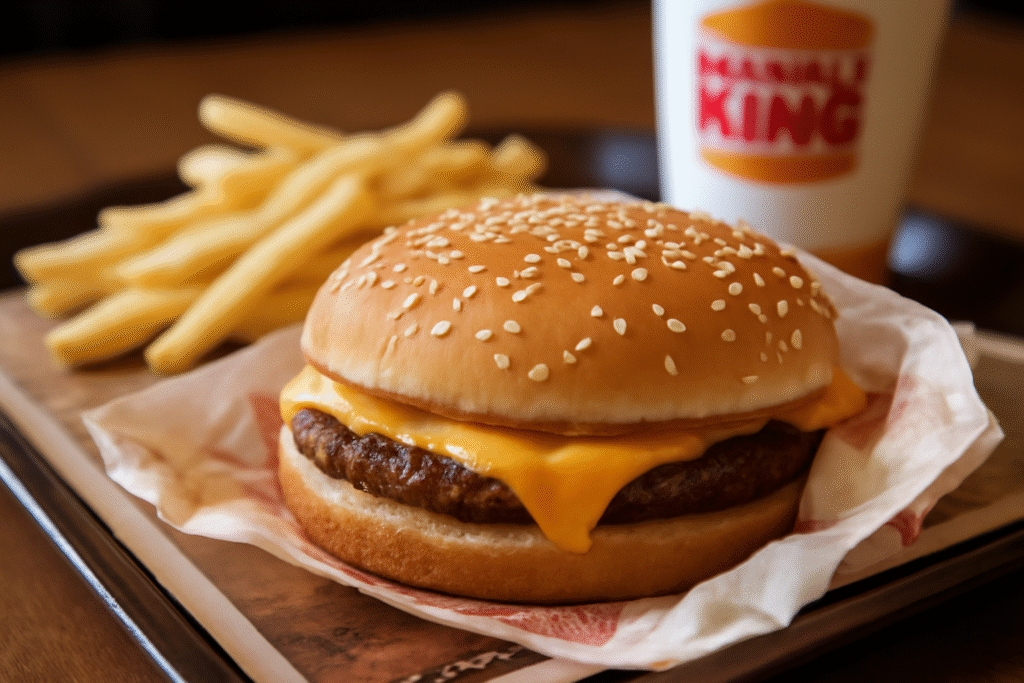Burger King is one of the most recognized fast-food chains in the world, and its cheeseburger remains a classic menu item enjoyed by millions. But while it may satisfy cravings, understanding Burger King cheeseburger nutrition is essential for those watching calories, macronutrients, or overall health.
Fast food can fit into a balanced diet if consumed in moderation, but being aware of the nutritional profile of each item helps in making informed choices. This article provides a comprehensive breakdown of Burger King cheeseburger nutrition, from calories to fat content, sodium levels, and even how it fits into various diets.
Calories in a Burger King Cheeseburger
A standard Burger King cheeseburger contains approximately 283 calories. While not the highest among fast-food burgers, those calories add up quickly when paired with fries, sodas, or other menu items. For someone on a 2,000-calorie diet, one cheeseburger accounts for about 14% of daily intake.
Calories vary depending on portion size and customizations such as extra cheese, sauces, or double patties.
Macronutrient Breakdown
The nutrition profile of a Burger King cheeseburger can be broken down into three main macronutrients:
-
Protein: About 15 grams per serving. This supports muscle maintenance and satiety.
-
Fat: Around 12–13 grams, with a mix of saturated and unsaturated fats.
-
Carbohydrates: About 27 grams, primarily from the bun.
This balance provides energy, though the higher fat-to-protein ratio may concern individuals following certain diets.
Fat Content in a Burger King Cheeseburger
A single cheeseburger has about 6 grams of saturated fat, which is roughly 30% of the recommended daily limit for a 2,000-calorie diet. While fat is essential for health, excessive saturated fat intake is linked to heart disease.
Customizations like bacon or extra cheese can double the fat content, making portion awareness critical.
Protein Power
With 15 grams of protein, the Burger King cheeseburger provides a decent source of this vital nutrient. Protein helps in building muscle, repairing tissues, and keeping hunger at bay. For individuals balancing macros, pairing the cheeseburger with a side salad rather than fries can help keep the meal more nutrient-dense.
Carbohydrates and Fiber
The 27 grams of carbs primarily come from the bun and ketchup. The cheeseburger contains about 1–2 grams of fiber, which is relatively low. Since fiber aids in digestion and satiety, those who consume fast food often should compensate with fiber-rich foods throughout the day.
Sodium Content
One Burger King cheeseburger contains about 560 mg of sodium, nearly 25% of the daily recommended intake. High sodium intake is linked to hypertension and cardiovascular issues, making this a concern for frequent fast-food consumers. Ordering multiple items in one meal can easily push sodium intake well beyond healthy limits.
Cholesterol Levels
Each cheeseburger has around 40 mg of cholesterol, about 13% of the recommended daily limit. While moderate, consuming multiple animal-based fast foods in a day can increase cholesterol intake substantially.
Micronutrients in a Burger King Cheeseburger
Although fast food is often criticized for being “empty calories,” Burger King cheeseburgers provide some micronutrients:
-
Calcium (from cheese): Supports bone health
-
Iron (from beef): Important for oxygen transport
-
Vitamin B12: Supports nerve function and energy metabolism
However, the vitamin and mineral content does not outweigh the high sodium and fat levels.
Comparing Burger King Cheeseburger to Other Fast-Food Burgers
| Burger | Calories | Protein | Fat | Sodium |
|---|---|---|---|---|
| Burger King Cheeseburger | 283 | 15g | 12g | 560mg |
| McDonald’s Cheeseburger | 300 | 15g | 13g | 680mg |
| Wendy’s Jr. Cheeseburger | 280 | 14g | 13g | 620mg |
This comparison shows Burger King’s version is slightly lower in sodium and calories, but not significantly different nutritionally.
Burger King Cheeseburger and Weight Loss
For individuals aiming to lose weight, occasional consumption of a Burger King cheeseburger can fit into a calorie-controlled diet, provided the rest of the day includes nutrient-dense meals. The key is moderation and portion balance.
Pairing a cheeseburger with water and a side salad instead of fries and soda cuts calories by several hundred, making it a lighter fast-food choice.
Is the Burger King Cheeseburger Keto-Friendly?
On its own, the Burger King cheeseburger is not keto-friendly due to its 27 grams of carbs from the bun. However, removing the bun and ketchup transforms it into a low-carb option with mostly protein and fat, aligning better with ketogenic or low-carb diets.
Is It Suitable for High-Protein Diets?
With 15 grams of protein, it provides a moderate amount but may not fully satisfy those on a high-protein diet. Adding a grilled chicken sandwich without bread or ordering double meat may improve protein intake while staying within dietary goals.
Healthier Alternatives at Burger King
For those who want to enjoy Burger King but keep meals healthier, consider these swaps:
-
Whopper Jr. without mayo: Fewer calories and less fat
-
Grilled chicken sandwich: Higher protein, lower fat than a cheeseburger
-
Side salad instead of fries: Adds fiber and vitamins
-
Water or diet soda: Cuts hundreds of calories from sugary drinks
Making small adjustments significantly changes the overall nutrition of the meal.
How Often Can You Eat a Burger King Cheeseburger?
Nutritionists recommend viewing fast food as an occasional indulgence rather than a daily staple. Eating a cheeseburger once in a while is unlikely to harm long-term health, but regular consumption can contribute to weight gain, high cholesterol, and elevated sodium intake.
Burger King Cheeseburger Nutrition in Context
When evaluating Burger King cheeseburger nutrition, it’s not just about the numbers—it’s about overall dietary balance. The cheeseburger can fit into a diet if you account for calories, fat, and sodium elsewhere in your meals. Pairing it with fresh fruits, vegetables, and whole grains during the day helps offset nutritional gaps.
Also read : How Many Calories Does Walking 15000 Steps Burn? Amazing Facts You Must Know
FAQs
How many calories are in a Burger King cheeseburger?
About 283 calories per burger.
Is the Burger King cheeseburger healthy?
It’s moderate in calories and protein but high in sodium and fat. Best consumed occasionally.
Does the Burger King cheeseburger have fiber?
Yes, about 1–2 grams, which is relatively low compared to daily needs.
Is it keto-friendly?
Not with the bun, but removing the bun and ketchup makes it low-carb.
How much sodium does it contain?
Around 560 mg, nearly 25% of the daily recommended intake.
What’s healthier at Burger King than a cheeseburger?
Options like grilled chicken sandwiches, Whopper Jr. without mayo, and side salads provide lighter alternatives.
Conclusion
The Burger King cheeseburger is a tasty fast-food classic with 283 calories, 15 grams of protein, 12 grams of fat, and 560 mg of sodium. While it provides some protein and essential minerals, it is high in sodium and saturated fat. Consuming it occasionally as part of a balanced diet is fine, but relying on it regularly may pose health risks.
By understanding Burger King cheeseburger nutrition and making mindful choices, you can enjoy it guilt-free while maintaining your health goals.



